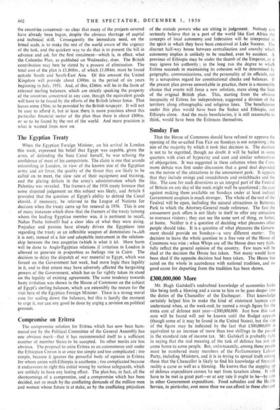Compromise on Eritrea
The compromise solution for Eritrea which has now been ham- mered out by the Political Committee of the General Assembly has one obvious merit—that it has recommended itself to a sufficient number of member States to be accepted. Its other merits are less obvious. The proposal to unite Eritrea as an autonomous unit under the Ethiopian Crown is at once too simple and too complicated ; too simple, because it ignores the powerful body of opinion in Eritrea for whom union with Ethiopia is anathema ; too complicated because it endeavours to right this initial wrong by various safeguards, which are unlikely to have any lasting effect. The plan has, in fact, all the shortcomings of a compromise, and a compromise which has been decided, not so much by the conflicting demands of the million men and women whose future is at stake, as by the conflicting ptejudices of the outside powers who are sitting in judgement. Nobody can seriously believe that in a part of the world like East Africa the concepts of local autonomy and federation will be interpreted in the spirit in which they have been conceived at Lake Success. The discreet half-way house between centralisation and anarchy which autonomy implies is unlikely to be reached, even by accident. A province of Ethiopia may be under the thumb of the Emperor, or it may ignore his authority ; in the long run the degree to which Eritrea succeeds in maintaining its cohesion will be determined by geography, communications, and the personality of its officials, not by a scrupulous regard for constitutional checks and balances. If the present plan proves unworkable in practice, there is a reasonable chance that events will force a new solution, more along the lines of the original British plan. This, starting from the obvious incapacity of Eritrea for independence, suggested a division of the territory along ethnographic and religious lines. The beneficiaries under this plan would have been the Sudan and Ethiopia, not Ethiopia alone. And the main beneficiaries, it is still reasonable to think, would haVe been the Eritreans themselves.






































 Previous page
Previous page